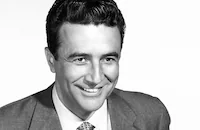Dangerous Money

Brief Synopsis
Cast & Crew
Terry Morse
Sidney Toler
Gloria Warren
Victor Sen Young
Rick Vallin
Joseph Crehan
Film Details
Technical Specs

Synopsis
On a foggy night on board a ship bound for Samoa and Australia, undercover agent Scott Pearson tells detective Charlie Chan that he is being sent to Samoa to investigate the sudden appearance of money and artworks stolen from Philippine banks during the Japanese invasion. Later, while the passengers gather in the salon for a ceremony to celebrate the crossing of the equator, Pearson is stabbed in the back and killed. After warning the other passengers to stay where they are, Chan and the captain examine Pearson's room and discover that it has been searched. The captain reassures Chan that Pearson's portfolio is in his office safe, and Chan notices that Pearson's papers mention a man named Lane, but do not identify him. Later, Chan questions the ship's passengers, who include Freddie Kirk, an exhibition knife-thrower; P. T. Burke, a trader in cotton; Professor Henry Martin, an ichthyologist, and Henry's wife Cynthia; Tao Erickson, a half-Polynesian who owns a restaurant on Samoa, and Tao's Polynesian wife Laura; missionaries Rev. and Mrs. Whipple; and Rona Simmonds, an English tourist in love with the ship's purser, George Brace. After he dismisses most of the passengers, Chan speaks privately to Rona and George and, while advising them to speak the truth, asks them to identify Lane. George, however, insists that they have nothing to reveal. Later, Chan sets a trap to catch the killer, but, although an attempt is made on the detective's life, the killer avoids discovery. Chan's son Jimmy checks the knife used in the attack against Pearson for fingerprints, but finds none. Chan then learns that Burke and Kirk are blackmailing Rona. The ship docks in Samoa, giving Chan twenty-four hours to solve the murder before he must leave for Australia. His oldest son sends him a telegram, which explains that Rona's father was an Australian, who was stranded during the war in Manila with valuable art objects, and Rona is now trying to discover their whereabouts. Chan discovers that Rona is traveling under papers that were falsified by Brace and that is why Burke is blackmailing her. Chan questions Burke, but Burke is killed by a thrown knife before he can reveal anything. Meanwhile, Jimmy and Chan's assistant, Chattanooga Brown, stumble upon money hidden in a fish museum near the Ericksons' restaurant. After Kirk is killed, the rest of the suspects converge on the fish museum. Chan learns that Whipple is the head of a gang, which includes the Ericksons, Burke and Kirk, and which planned to sell the stolen art works. The Whipples are then revealed to be Lane and his valet, Joseph Murdock, who was dressed as a woman. Murdock, the murderer, shot the blades through a gun and thus was able to escape detection.

Director
Terry Morse
Cast

Sidney Toler
Gloria Warren
Victor Sen Young

Rick Vallin

Joseph Crehan

Willie Best
John Harmon
Bruce Edwards
Dick Elliott

Joe Allen Jr.
Amira Moustafa
Tristram Coffin
Allan Douglas
Selmer Jackson
Dudley Dickerson
Rito Punay
Elaine Lange

Emmett Vogan
Leslie Dennison
Gerardo Sei Groves
Kit Carson
Mavis Russell
Don Maccracken
Crew
William Austin
Wesley Barry
James S. Burkett
Glenn Cook
Richard Currier
Edward J. Kay
Miriam Kissinger
Tom Lambert
Dave Milton
Harry Ross
William Sickner

Film Details
Technical Specs

Articles
Dangerous Money -
Dangerous Money is mainly for Chan fanatics: those fans who wish to see all the available Charlie Chan films (a few are lost) for the sake of completeness. The seemingly unanimous verdict on this entry is that it is one of the least distinguished of the bunch. Chan's case involves a trove of art objects being brought to Samoa aboard a ship. When the Treasury agent guarding the art is murdered, Chan takes over to solve the mystery, but not before there are more murders and Chan uncovers a connection to counterfeit money dating to the Japanese invasion of the Philippines. The action plays out aboard the ship and in the jungle setting of the island.
The budgets for the Chan films had dropped dramatically when the series shifted from Fox to Monogram, with Monogram devoting well under $100,000 per title. As a result, there are fewer atmospherics, a less-lively supporting cast, and lower overall production values as compared to the Fox entries. Case in point: look for a character on board the ship reading a plain-looking book, entitled simply "FISH."
Critics at the time considered Dangerous Money quite routine. "Headed for bottom-rung billing," declared Variety. Even Chan himself, in the film, declares this case to be in "mere routine line of duty." Victor Sen Yung appears in his tenth Chan outing overall (dating back to the Fox era), as the Number Two Son, Jimmy. Director Terry Morse was primarily an editor at Warner Brothers and Fox at various times in his career, but he also directed about twenty low-budget films at Monogram and elsewhere, remaining almost entirely in the "B" movie world. He had directed an earlier Chan movie, Shadows Over Chinatown (1946).
Toler would go on to do one more Chan picture, The Trap (1946), before his death in 1947. Monogram pressed on with the series for two more years, casting Roland Winters as the detective.
By Jeremy Arnold
SOURCES:
Michael R. Pitts, Famous Movie Detectives
Ken Hanke, Charlie Chan at the Movies

Dangerous Money -
Quotes
Trivia
Notes
The film's working title was Hot Money. The title card reads "Charlie Chan in Dangerous Money". Hollywood Reporter news items add the following information about the production: Prior to his appearance in this film, Rick Vallin served a term in the U.S. Coast Guard. Restaurateur "Don the Beachcomber" gave technical advice on the South Sea Islands. For additional information about the "Charlie Chan" series, consult the Series Index and see the entry for Charlie Chan Carries On in the AFI Catalog of Feature Films, 1931-40; F3.0663.














